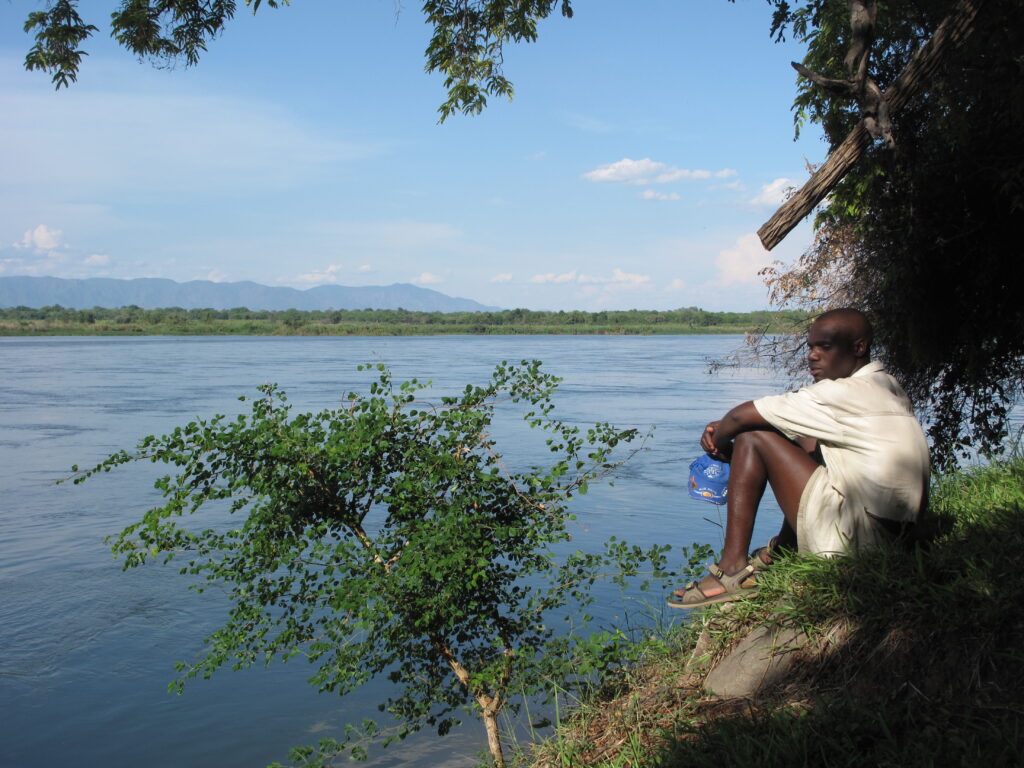L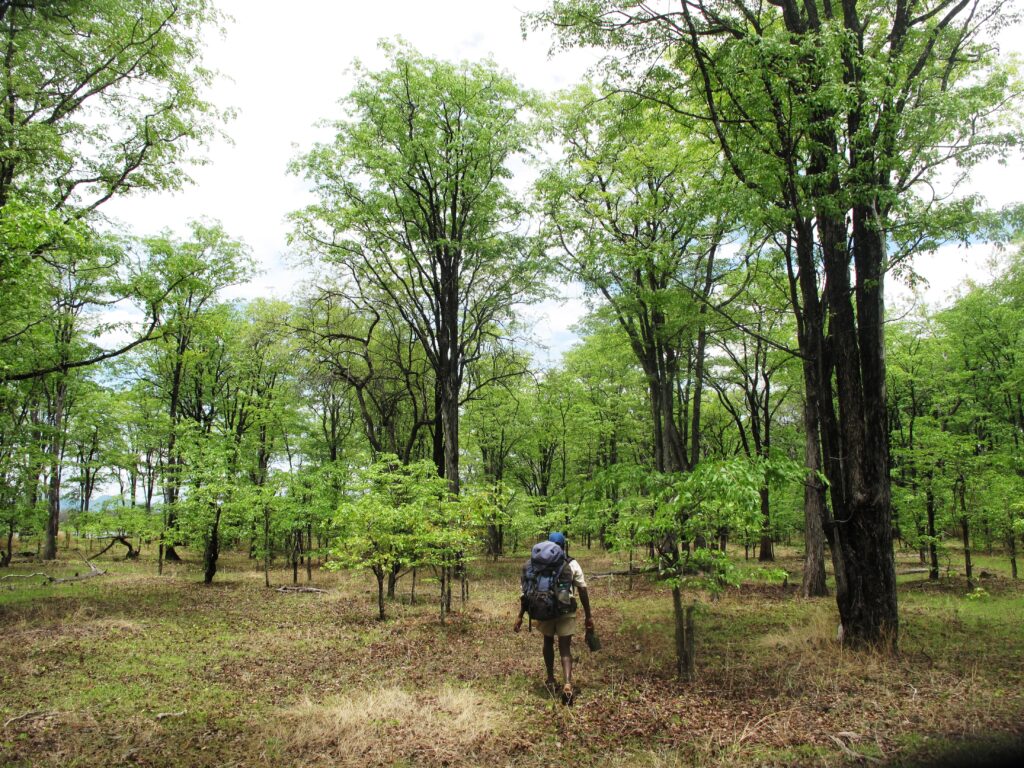 In certain respects, the Lower Zambezi stretch was a letdown. Don’t get me wrong, we enjoyed fantastic moments and sightings and met some fine people along the way, but delays constantly shackled our advance and we jerked along spasmodically. The setbacks were unavoidable but frustrating nonetheless. I have been anticipating the lower valley stretch for years – since the Borderline concept took root – and events simply didn’t unfurl as envisaged. Although the entire walk has been a stop/start affair, our progress through the lower valley was chameleon-like.
In certain respects, the Lower Zambezi stretch was a letdown. Don’t get me wrong, we enjoyed fantastic moments and sightings and met some fine people along the way, but delays constantly shackled our advance and we jerked along spasmodically. The setbacks were unavoidable but frustrating nonetheless. I have been anticipating the lower valley stretch for years – since the Borderline concept took root – and events simply didn’t unfurl as envisaged. Although the entire walk has been a stop/start affair, our progress through the lower valley was chameleon-like.
Rifa
We left Nyamumba Parks post at the foot of Kariba Gorge at 8 am on 7 November 2009. After the gorge, almost any terrain would have been tolerable and the flat ground of the Rifa safari area was a pleasure. Although the heat was intense, we ate up the distance and strode into ‘Old B’ camp a few hours and 20 kilometers later. It was refreshing to see some game en route, as well as plenty of fresh sign, including that of a lion pride.
Present at ‘Old B’ camp were a couple of camp attendants and we chatted with them awhile, as we rested and rehydrated. Jephita held the camp attendants’ attention as mine wandered. With my wandering attention went my eyes and they were drawn to a plaque on the bole of a large tree about ten meters away. Curiosity aroused, I ambled over to the tree and discovered that the plaque was dedicated to one Gerry von Memerty, who was killed by an elephant in the area.
And now it is confession/excuse time: because my one and only camera battery had been thoroughly flattened by that stage, I could not photograph the plaque. Strive as I did to coax 5 seconds of life from the exhausted cell, it was to no avail. And so, in a moment of sheer journalistic incompetence, I jotted down the dedication to Gerry von Memerty on a piece of paper and stuffed it into my backpack. Needless to say, that piece of paper went astray at some point, and to this day, so many months later, I do not know the exact wording on the plaque.
The mystery of who Gerry von Memerty was and how he died was to remain in my mind for many months and many miles. Nobody we came across between Chirundu and Kanyemba knew anything about the man, and even a query on my favorite website www.accuratereloading.com drew a blank. Eventually, I would unearth the story of Gerry von Memerty’s demise in the most unlikely fashion, but we will get to that in due course, probably in the next Borderline story, if my word approximation is anywhere near the mark.
Rifa
We lazed about at ‘Old B’ camp for a couple of hours before covering the few kilometers to ‘New B’ camp, where we stepped up the lazing about. From the camp staff who plied us with refreshments, I learned that my friend, professional hunter Cliff Walker, was in camp, holidaying with his Australian cousins. Together with another friend, PH Bruce Watson, Cliff owns Watson/Walker Safaris, and they operate Rifa in conjunction with Mr. Frik Muller. These names – Muller, Walker, Watson – are respected names in Zimbabwean hunting circles and it is telling that they are associated with what is still a fantastic hunting destination.
We lingered at ‘New B’ for a few days, ostensibly recovering from the ordeal in Kariba Gorge but actually just enjoying the company and food. I went fishing a couple of times with Cliff and his cousins, and although no worthy fish were caught, a fun time was had by all. Besides fishing, there were evening braais on the riverbank, shooting competitions and, I kid you not, handstand competitions!
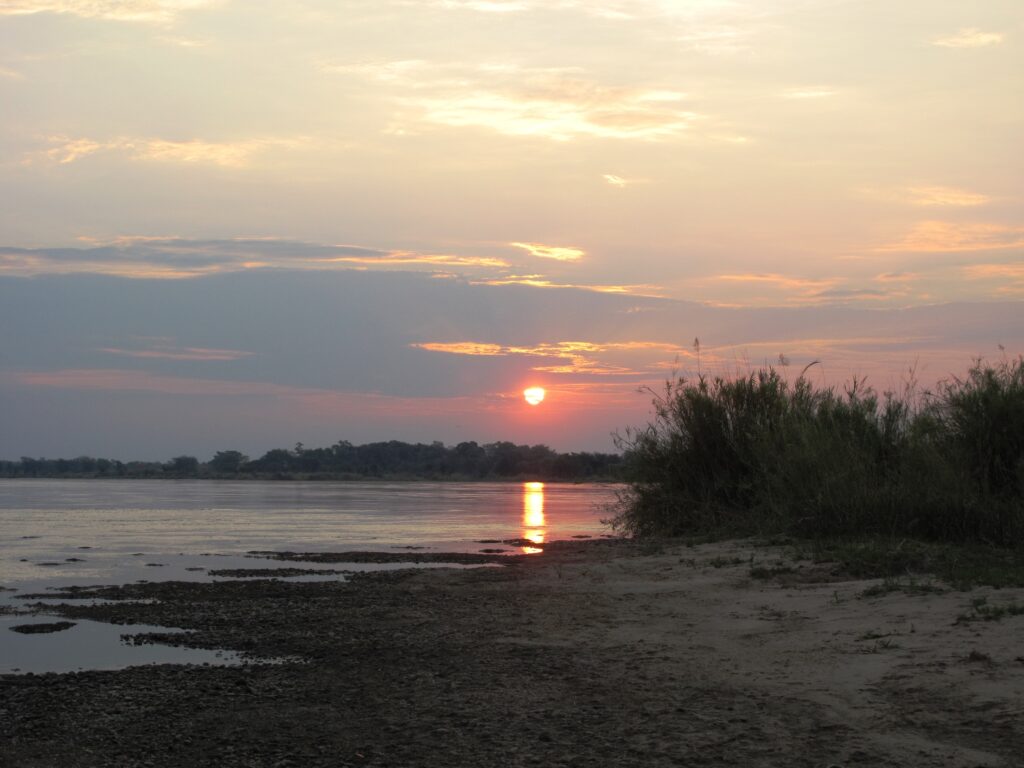 I did not feature in the hand-standing but am pleased to record that Cliff and I shared first place in the shooting, leaving the Aussies to share the wooden spoon. It’s so fine when the Aussies come second in a sporting discipline, is it not? Even if it is an unofficial event and their team is severely handicapped by beer. The highlight of the shooting was when one of the cousins, Troy, inadvertently pulled both triggers of Cliff’s .577 Nitro Express double rifle at the same time! The result of the double-tap was hilarious for all but Troy and Cliff. As Troy bemoaned his battered shoulder and pride,
I did not feature in the hand-standing but am pleased to record that Cliff and I shared first place in the shooting, leaving the Aussies to share the wooden spoon. It’s so fine when the Aussies come second in a sporting discipline, is it not? Even if it is an unofficial event and their team is severely handicapped by beer. The highlight of the shooting was when one of the cousins, Troy, inadvertently pulled both triggers of Cliff’s .577 Nitro Express double rifle at the same time! The result of the double-tap was hilarious for all but Troy and Cliff. As Troy bemoaned his battered shoulder and pride,
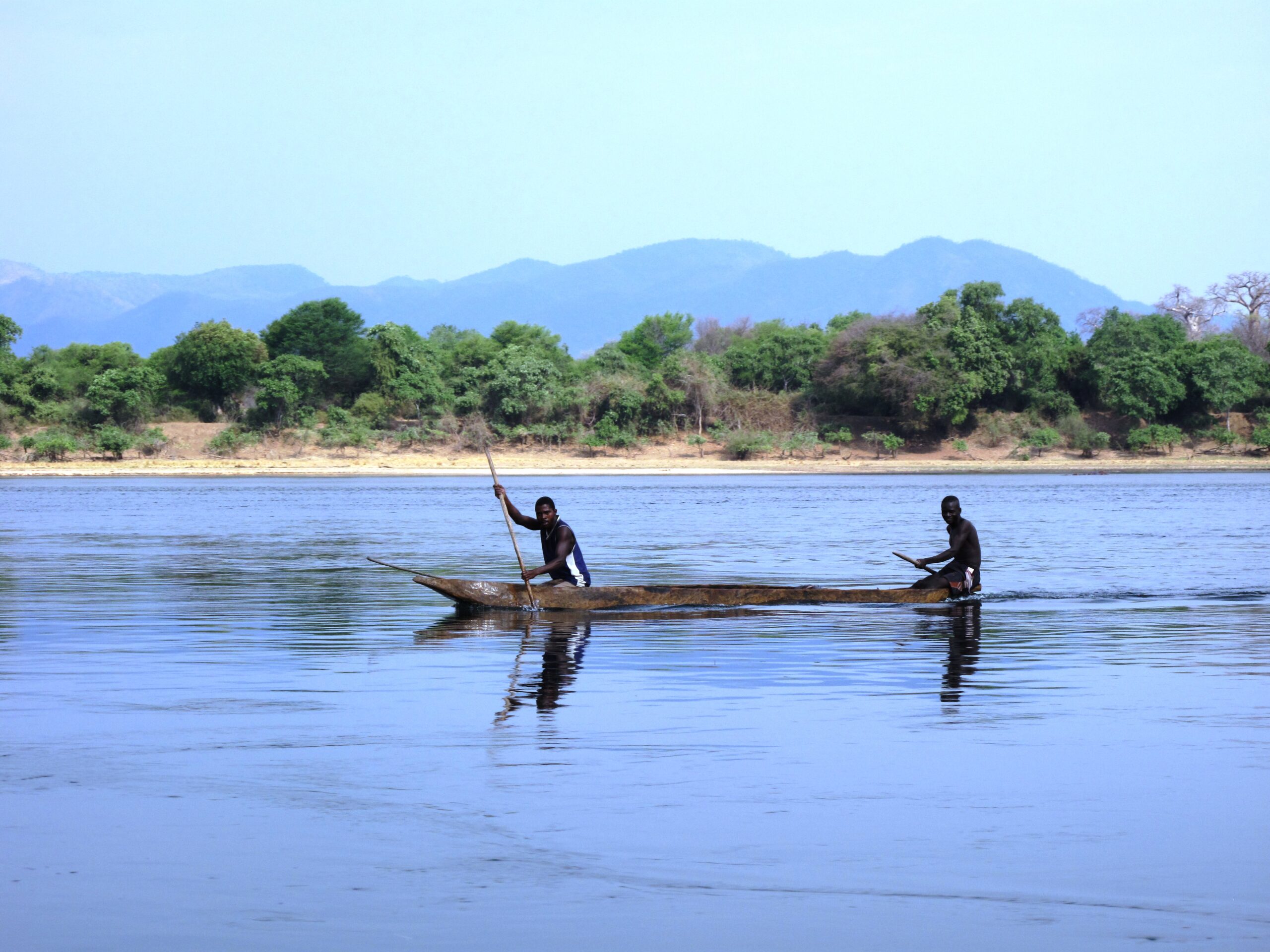
Cliff lovingly wiped down his expensive rifle which, after pounding Troy, had forcefully torn itself from his unsuspecting grip, cart-wheeled through the air, and clattered to the hard earth. Once the rest of us had laughed ourselves sore, there was considerably more sympathy for the rifle than for Troy.
Our walk through the main part of Rifa – from ‘New B’ to the Rifa education camp close to Chirundu – was most enjoyable. It made an enlightening change to walk a safari area and actually see game. Also enlightening was the fact that Cliff Walker had arranged for our backpacks to be transported to the Rifa camp by his driver, and so we walked unburdened. Although we saw no big game, there was an abundance of plains game (impala, kudu, bushbuck, eland, warthog), and we crossed the fresh spoor of buffalo, lion, and elephant. After what we had not seen in safari areas on the Kariba shoreline, Rifa was a revelation.
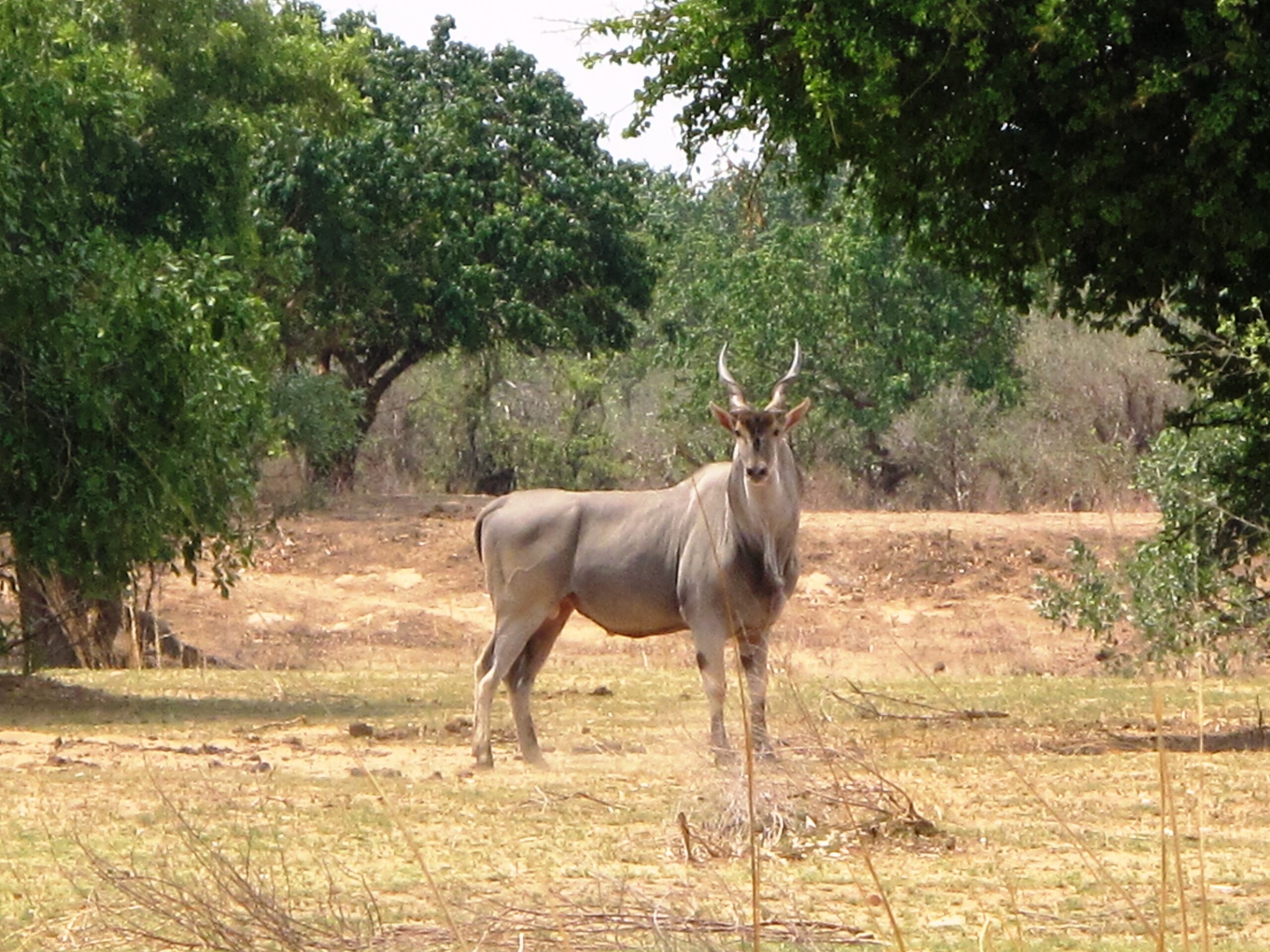
The question is, of course, if Frik Muller and those operating Rifa before him can do it, what the hell is the problem with the authorities (safari operators/national parks and forestry personnel) in areas above the dam wall? There is absolutely no excuse for the desecration of any particular wildlife area in this country, in days gone by, now, or ever. It simply means that some people are not doing their jobs properly – managing and preserving our wildlife heritage for future generations – and they should, therefore, lose their positions/areas. It is not only Rifa that I am able to use as an example of a well-managed Zambezi Valley safari area. As I was to discover, all the areas between the foot of Kariba Gorge and the Mozambique border (Rifa, Nyakasanga, Sapi, Chewore and Dande) carry acceptable wildlife populations.
Nyakasanga
Rifa education camp provided yet more positivity. There we met Mr. Dave Winhall, the resident guide employed by the Zimbabwe Professional Hunters & Guides Association, which administers the camp. When we arrived, Dave and the camp staff were wrapping up a weeklong bush education camp for schoolchildren, sponsored by the ZPHGA and Safari Club International. The education camps are an ongoing process and dozens are conducted annually – just one more point to add to the lengthy list of positives that hunters contribute to wildlife conservation.
The morning after arriving at Rifa camp, Jephita hitched a ride from Chirundu on a Harare-bound fuel tanker in order to collect funds. True to form, the fund-finding trip took longer than it should have, and it would be two weeks before Jephita returned. I spent a few days at Rifa camp with Dave, enjoying the company and country, before moving through Chirundu itself (typical border town – a cesspool of filth, cheap liquor, and debauchery) to Malcolm van de Riet’s Chirundu crocodile farm. What contrast Chirundu and its immediate surrounds provide. The town itself is downright nauseating yet it is encircled by pristine bush. One has only to walk 15 minutes from town in any of three directions and keep looking forward in order to have a fair chance of convincing oneself that one is in the wilderness proper and that the hellhole of Chirundu does not even exist. For those like me who are prone to bouts of short-term memory loss, it is that much easier.
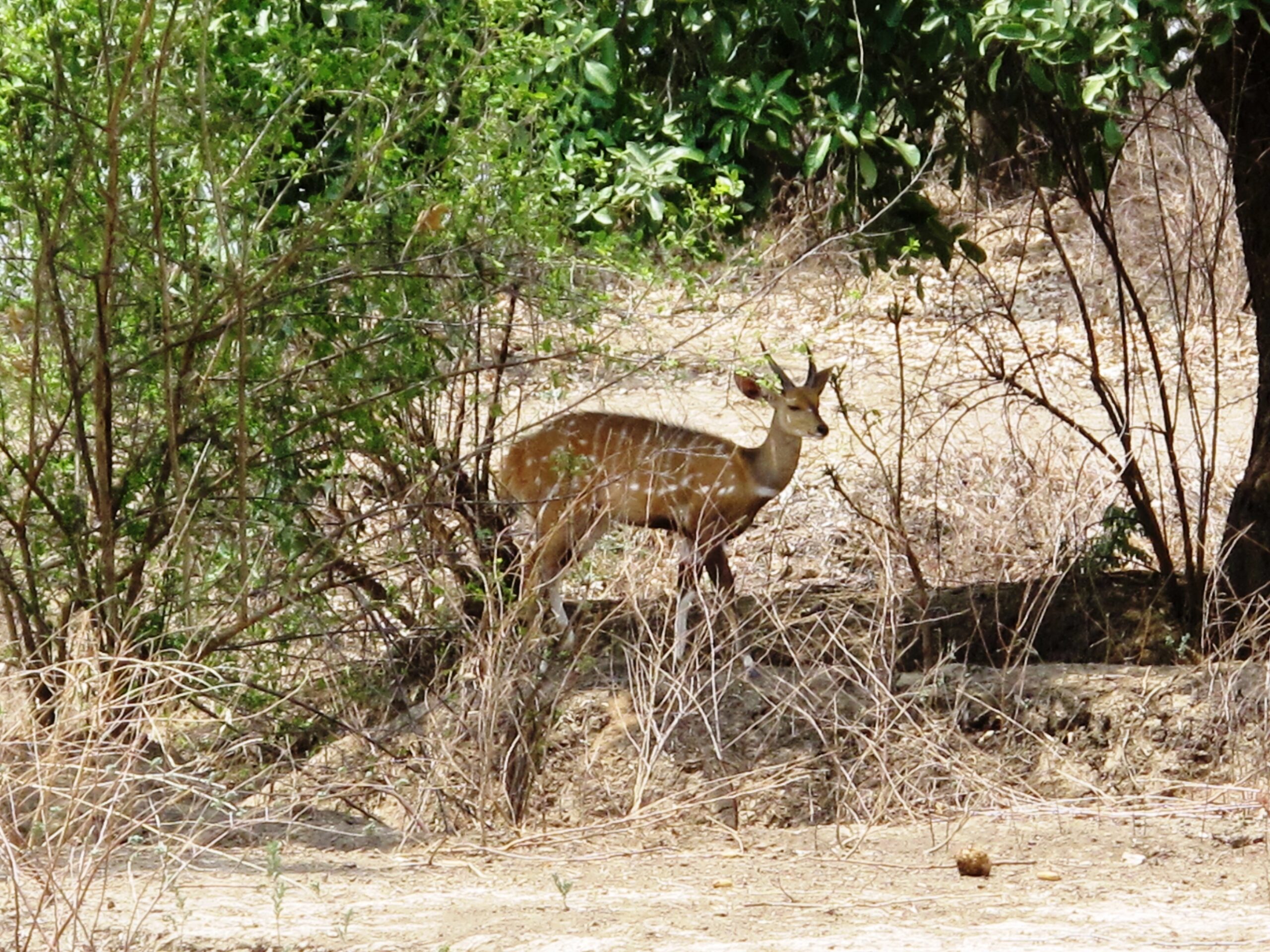
Arriving at the crocodile farm (5 km east of Chirundu), I was most pleased to discover that my good friend, Ben McCarthy, was managing the van de Riet crocodiles. Ben invited me to stay in his spare room, and I needed no coaxing. Then followed a most relaxing interlude as I whiled away the days catching up on notes, sorting through photos, and partaking in entertaining chat sessions with Ben and Malcolm. Solutions to many of the World’s problems were proposed and seconded during those chat sessions.
With Jephita’s return came problems. I was laid low with a severe bout of malaria, though of greater concern was the discovery that my beloved Canon G10 was also ailing. The malaria came and went, but my camera’s condition was serious and would ultimately prove terminal. Salt poisoning it was, from my sweat, of course. The shutter button and zoom lever were clogged with salt, and try as I did, I only managed to temporarily stabilize the camera. I could still take pictures with great difficulty – minutes spent partially extracting the shutter button from its salt bed with a fingernail – but I knew it was only a matter of time….
Another concern of mine at that stage was Jephita’s mental state. Although he had undoubtedly been the walk’s driving force the majority of the way, he was beginning to show signs of strain.
There were problems at home, and although I had granted him leave several times, those problems remained unresolved. Another issue that was weighing heavily on Jephita’s mind was that of lions. In Kariba and again in Chirundu, we had been related a number of horrifying man-eating lion tales and whilst they certainly did have an impression on me, they shook Jephita to the core.
I told him that whilst there was reason for concern, there was no need for alarm and that he should consider the facts. It was true that man-eaters in the Chirundu/Makuti area had killed seven people in the space of a year, but each and every victim had been either walking, blundering around drunk or sleeping in the bush after dark. Without exception, as I pointed out to a glum Jephita, with no visible effect. Now, we certainly wouldn’t be waltzing around in the woods after dark in lion country, would we? And therefore, we wouldn’t bump into any man-eating lions, not so? What were those chaps thinking as they set off into lion country after dark, in any case? Lions fear nothing at night. One would think they would have been aware of that, having lived in lion country their entire, albeit abruptly terminated, lives. I knew then, and I know now that my attempts at reassuring Jephita were unsuccessful, but I still can’t figure out why….
Rukomechi to Mana
We eventually left the Chirundu area and pressed on downstream, to Mongwe camp, and the following day, Mangwandi ‘D’ camp. I was out of condition and inwardly thankful for the flat terrain. As was the case in Rifa, I was pleased to note much sign of wildlife throughout Nyakasanga, particularly that of plains game animals: zebra, kudu, waterbuck, bushbuck, eland, and impala. I have accompanied several big game hunts in Nyakasanga in days gone by and have always been astounded by the prolific plains game in the area. Although there was an abundance of fresh spoor, we did not actually see as many animals as I imagined we would. I put this down to the early rain, which had fallen whilst we were in Chirundu. It hadn’t been much (an inch or two), but enough to get the green sprouting and the game moving.
At Mangwandi we befriended the Parks Rangers posted there and I quizzed them as to the new location of Rukomechi camp, which had been moved, or so I’d heard on the valley grapevine. The rangers assured us that there was naught to concern ourselves with – all we needed do was walk the river road and stay with the vehicle tracks. The only vehicles using the river road at that time of the year were coming to and from Rukomechi, they said, and we couldn’t go wrong. Famous last words, as we discovered the following day.
We followed the vehicle tracks to the Nyakasanga/Zambezi junction, up the former watercourse and, contrary to all my instincts, away from the latter. Why in the world, I thought, would Wilderness safaris site their new camp away from the river? It seemed bizarre but we had been advised to follow the vehicle tracks and so we did, for hours on end, as the burning sun ascended and our backpack shoulder straps dug deep. Maybe the new Rukomechi had been sited somewhere on the Rukomechi river? I inwardly reasoned, trying to convince myself we were still on track. But why would the Wilderness Safaris management choose the Rukomechi over Africa’s greatest river? It just didn’t make sense.
We reached the Rukomechi River (Nyakasanga/Mana Pools boundary) at noon, at a point about 6 kilometers from its mouth. We were tired, hot, hungry and confused, and flopped down in the shade to rest, cool down, nourish ourselves and consolidate. It was then that a plan came to me and I rummaged through my pack for the satellite phone. A few minutes later I was chatting to my friend, professional hunter Richard Tabor, a man who has hunted Nyakasanga often and knows the area well. Rich said he had never been to the new Rukomechi camp but had heard it was not far from the old site. When I described our position to him, he advised me to follow the Rukomechi back down to the Zambezi, locate the old site, and figure out the way forward from there. Sound advice – there would surely be a couple of guys at the old site who could point us in the right direction….
That afternoon a thunderstorm came rolling in over the Zambian escarpment and we made all haste down the Rukomechi, covering ground we needn’t have but for my uncertainty earlier in the day. As we strode through the heavy sand, racing rain that thankfully never came, I silently chided myself. I should have known better by that stage – although we had only moved off the Zambezi a couple of times before, each inland incursion had brought about problems. We covered at least 10 unnecessary kilometers that day, but eventually reached the old Rukomechi campsite and subsequently the new camp. I noted for future reference that the new camp is a mere 3 kilometers from the old one and that it is still right on the Zambezi riverbank. Why in the world would Wilderness safaris site their new camp anywhere other than on the Zambezi, I ask you?
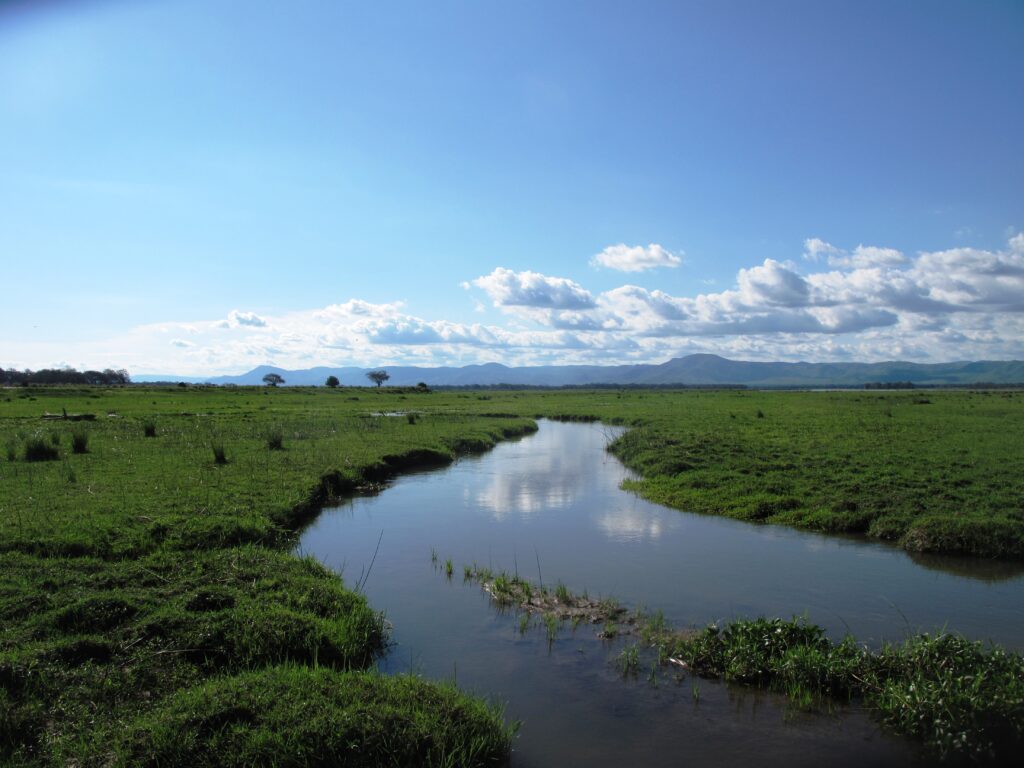 The day’s frustrations were erased that evening when we finally arrived at Rukomechi and I discovered with delight that my cousin, Clea Bridges, was in camp. I knew that Clea worked at Rukomechi but was not sure she’d be there, given that most camps had already closed for the season. As it turned out, Rukomechi was still in the process of winding up operations. Then ensued a prolonged shower session with plenty of hot water and a pleasant evening spent chatting under the stars with my cousin and her workmates. The comfort was rounded off perfectly by a restful night on a soft mattress. I was touched the following morning when presented with a packet containing fishing line and hooks, energy bars, and other items the Rukomechi camp staff felt we could make use of. Coffee became breakfast and then more coffee, and we set off late that morning. No matter – we were well rested and nourished and the walking mindset was starting to kick in again.
The day’s frustrations were erased that evening when we finally arrived at Rukomechi and I discovered with delight that my cousin, Clea Bridges, was in camp. I knew that Clea worked at Rukomechi but was not sure she’d be there, given that most camps had already closed for the season. As it turned out, Rukomechi was still in the process of winding up operations. Then ensued a prolonged shower session with plenty of hot water and a pleasant evening spent chatting under the stars with my cousin and her workmates. The comfort was rounded off perfectly by a restful night on a soft mattress. I was touched the following morning when presented with a packet containing fishing line and hooks, energy bars, and other items the Rukomechi camp staff felt we could make use of. Coffee became breakfast and then more coffee, and we set off late that morning. No matter – we were well rested and nourished and the walking mindset was starting to kick in again.
We made decent headway for the first hour or so, walking the riverbank and marveling at the spectacular scenery and abundant wildlife that is Mana Pools National Park. And then, with little warning, as I was appreciating the immensity of the Zambian escarpment to our left, we were mock-charged by an elephant from our right. It was the second time we had been mocked on the Walk – the first incident took place in Kariba, when we were walking a paved road, well within the town limits! Of course, the gurus will tell you not to run under any circumstances, but that is probably because the gurus are either carrying or being backed by a heavy caliber rifle at all times… anyway, theory is always more straightforward than practice, as the paragraph below will illustrate.
As was the case in Kariba, it was a lone bull. We had been walking for about an hour and were beginning to warm up when we noticed the bull break from the scrub line about a hundred meters off, striding down to the river, straight towards us, into the wind. As we saw the elephant, it stopped in its tracks, instantly immobilized by our scent. I hissed at Jephita to step up the pace – we needed to get out of the danger zone pronto. Moving as fast as we could across the bull’s front, we attempted just that, with heads swiveled, never taking our eyes off what could very easily blend our carcasses into the topsoil. The bull turned, and believing it intended giving way, I paused for a second to snap a picture, hardly breaking stride. And then it turned back and took a few steps towards us, head held high. Jephita decided that this was the moment to send the bull packing, and he stopped, clapped his hands loudly and hollered out a warning – ‘Hey, iwe!’
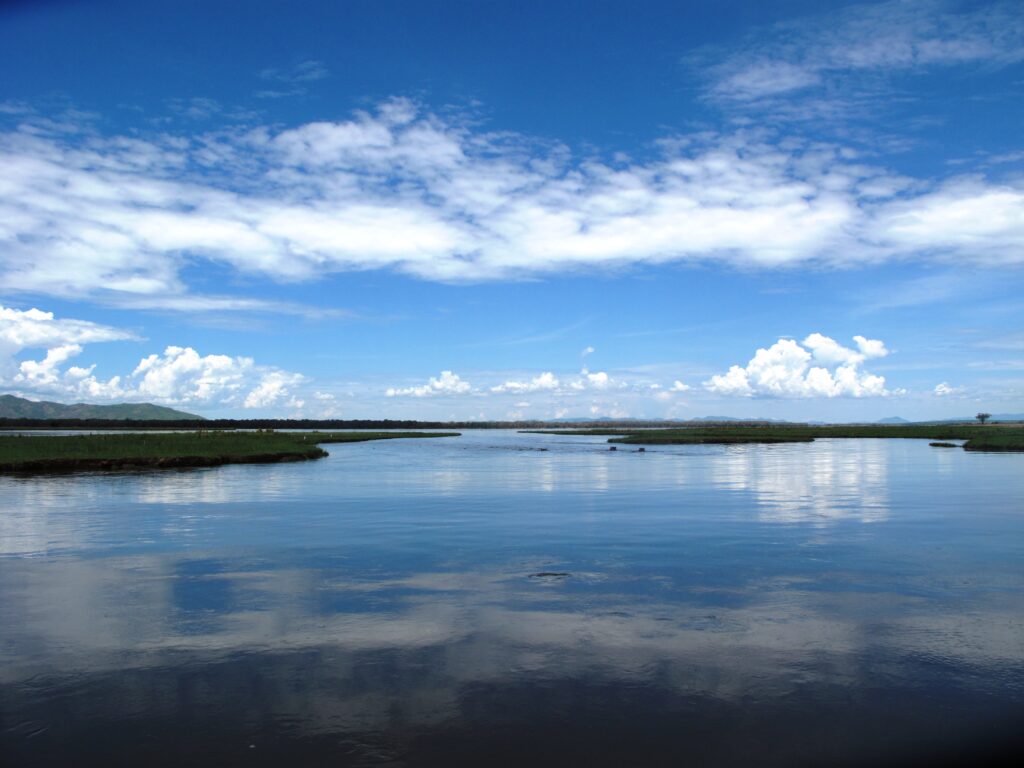
I don’t think Jephita even finished the word ‘iwe’ before shucking his backpack and taking to his heels – the bull did not take kindly to the challenge, simply lowering its head and charging. Lordy, how fast they can come! It took me less than a second to make a decision and follow Jephita’s flight path, though unlike him, I kept a little of my head and, consequently, my backpack, saving it for a last-second decoy.
Fortunately, the charge petered out as quickly as it had come about. Once the bull realized that the disruptive midgets had fled, it continued on its way down to the river. I have quite an amusing photograph of it striding past Jephita’s backpack. Interestingly, it didn’t even pause when it passed the backpack; it simply sauntered past disdainfully, long nose in the air. That made me wonder whether there was any point in saving my backpack for a last-second decoy… how well would it actually serve? What if I’d hit the deck when the elephant initiated the charge, just like Jephita’s pack had? Would the elephant have just sauntered past if (big if) I had managed to remain motionless? After all, Jephita’s pack had to be absolutely reeking of human… that mock charge certainly gave me food for thought… what is actually the right thing for an unarmed man to do when an elephant charges?
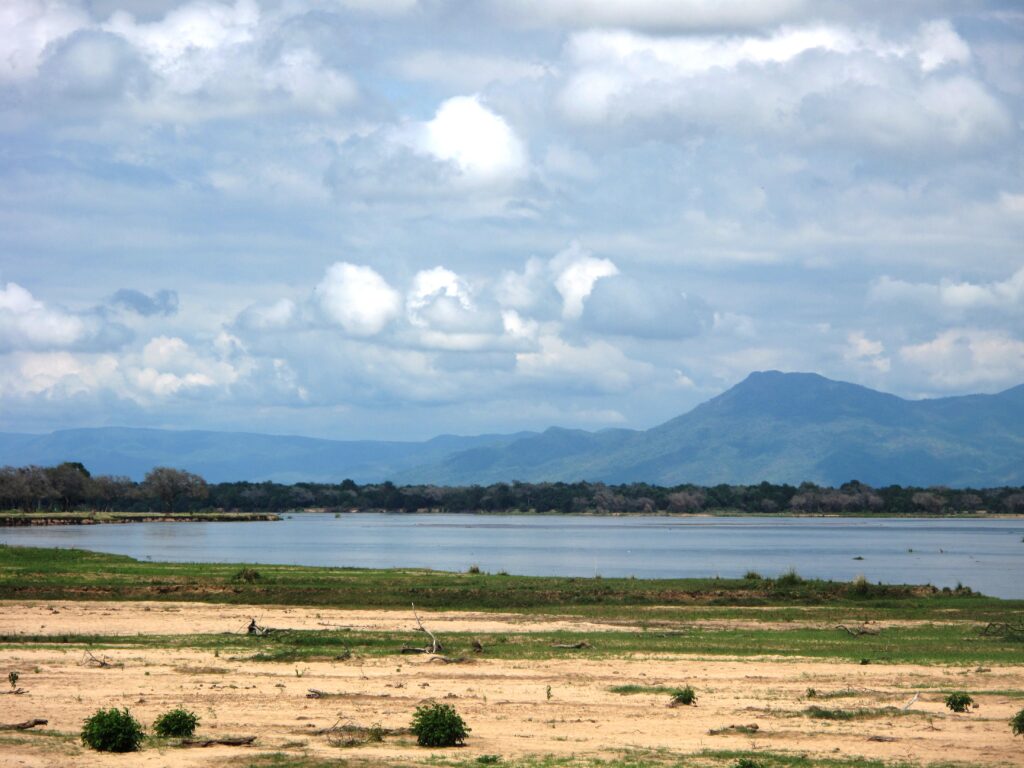
I don’t really go with the ‘never run’ story, because often there is time and space enough to get out of the way – to at least show the elephant that you understand who is boss. Most of the time that will work… assuming the charge is not deadly serious from the onset, of course. I know that if it is deadly serious, nothing but a heavy caliber bullet will stop it, so we will just focus on mock-charging here since that is the manner in which the vast majority of elephant charges begin. And we Borderline Walkers cannot consider the heavy caliber option anyway, so we would have no choice but to take to our heels at some point if faced with the deadly serious version. But what is one to do when mock-charged? Run or stand firm? I think every situation is different and one needs to make the decision on the spur of the moment. Would I have stood down both the elephant charges we have experienced on the walk if Jephita hadn’t run, or if I was alone? I don’t think so. I may have with the bull in Mana, because I knew it wasn’t a serious charge, it was initiated from quite a distance and I did have my pencil-flare gun to test out… on the other hand, running defused the situation effectively and what does one do when a mock-charge becomes deadly serious because some idiot has had the audacity to pop a puny pencil flare at an angry elephant bull? One that may just have a stomach gripe which has made it more anti-social than usual… maybe one should do as a well-known Zimbabwean writer described in his book and crawl between the elephant’s legs, as he says he did…. that was a bit unfair – he was crawling between a herd cow’s legs and not a charging bull’s, if I remember correctly….
That was a fantastic day, walking through Mana Pools West. We saw a multiplicity of wildlife and the early rain had cleansed the bush thoroughly. Everything was fresh and green, and my senses greedily absorbed the sights, sounds, and smells. A walk in the park it truly was. The only real downside to that day, and the days to come, was that taking decent photos was extremely difficult, my poor Canon G10 being in the condition it was. Had I an efficient camera, I could have fared much better. I still managed to get some reasonable shots, however, and that fact is indicative of the abundant opportunity presented. A favorite Mana picture of mine (though not particularly good) is one I took of four different species in one frame – elephant, impala, zebra, and waterbuck…
I had visited Mana Pools before (a couple of times actually), but walking through it saw it in a completely different light. On previous visits, I had been part of game-viewing groups and we had been guided by a couple of Zimbabwe’s most well-known and competent guides. How come then, I wondered as Jephita and I walked along through the different light, had we seen so little of Mana’s woodland on those excursions? If the guides were so competent, that is? I think that many people view Mana as one massive floodplain filled with lions and elephants, whether they’ve been there or not, and I know that I certainly did. But Mana is not just plains lions and elephants – close to the river there are tracts of mopani forest reminiscent of the lowveldt, and I felt quite at home walking through those areas. The only difference I could see between the Mana mopani and the lowveldt mopani is that the squirrels are smaller in Mana!
We reached Vundu camp in the late afternoon, and although it was closed for the season, there were a couple of guys looking after the place and they wasted no time making us feel at home. I was a bit jealous when another camp attendant waltzed in from a fishing excursion with a few sizeable tigerfish – between 5 and 8 pounds, I guessed. How badly I wanted to catch a decent tiger! I had tried a couple of times on the Kariba shoreline but to no avail, only succeeding in landing a couple of tiddlers. Little did I know what the fishing gods had in store for me… that night we slept on an elevated platform close to the riverbank and were serenaded by grunting hippos. I slept soundly, as one tends to after a day of backpacking.
Dawn the following morning brought about one of the most memorable wildlife experiences of my life, let alone the Borderline Walk. And that happening set the tone for what would prove to be a week chockful of fantastic experiences – real memories to cherish. Jephita had already risen and had gone to organize tea, and I lay snuggled in my sleeping bag, being serenaded by the early birds as they went about their business in the treetops around the platform. In due course, I heard a branch snapping, not far off. A snapping branch usually means a human or an elephant, but I had a feeling that all the humans in the camp were in a fairly inactive state at that hour. And then there were more snapping branch sounds, accompanied by a most familiar rumbling sound, very close at hand…
There were three bulls – two majongos and one older chap – and they were moving slowly through the fairly compact bush which Vundu camp is uniquely located in. That was the first thing that struck me about Vundu when we arrived the previous day – unlike most safari camps, the constructors did not deface the immediate proximity by bush-clearing everything. The two younger bulls peeled off, but the big bull kept coming towards the platform, pausing now and then to break off a branch, strip its leaves and thrust them into his mouth, or too simply select a tasty tidbit from the treetops, his probing trunk-tip efficiently encircling, plucking and placing each morsel in the recycler, ready for mastication. Eventually the elephant reached the platform, and there he continued feeding, a couple of meters from one overly awestruck spectator. The show lasted for about twenty minutes and any one second of that time was the closest I’d ever been to a wild elephant. And he was such a magnificent specimen, in his prime, maybe just beginning to go downhill physically. At one stage, I could have extended either a foot or hand and touched him on the head. Of course, I did not try! Long after the bull had moved off, I sat on the platform and considered what a fortunate fellow I was, to be in that place at that time…
Later that morning, somewhere between Vundu and Nyamepi (Mana main camp) we saw lions for the first time on the walk. There had been lions all around us in Matusadona, but we never physically saw one; plenty of nocturnal vocal and fresh spoor, but no sighting. I wonder how many lions saw us in Matusadona and elsewhere? Anyway, the lions we came across in Mana (a pride of 4 or 5) were on the edge of the floodplain, lazing about in the shade of a tree, and Jephita spotted them at extreme range. I think Jephita was most pleased with himself since he had had lion spotting on the mind from Kariba! Needless to say, lion viewing and photographing was not on the agenda and we made a wide detour through the bush, coming back down to the river a couple of kilometers further on. I didn’t say anything, for Jephita’s sake, but I knew that it was more likely we’d get scoffed in the mopani by the lion we couldn’t see than on the floodplain by the lions we could see.
We stayed at Nyamepi for two nights, in order to get some washing done – both kit and bodies. The Nyamepi interlude provided quality entertainment and excitement, in the form of monkeys cavorting around the campsite, a hippo dying in the river, and another close-range bull elephant encounter. The monkeys’ antics were hilarious, up until the point when they raided our humble campsite. I very nearly broke all sorts of Parks rules then. If only I’d had a gun… would have been hard to prove self-defense in that case… maybe momentary insanity would have swung it… not having witnessed the hippo’s death, I don’t actually know if it was entertaining or exciting, but am sure it was. Certainly, the aftermath was, as hundreds of crocs zoned in to feast off the carcass. Never have I seen such a congregation of crocodiles. Upon conclusion of the feast, most of the crocs chose to digest on a couple of expansive sandbanks. I sat and watched them for a while, recalling and pondering all the times I had taken a quick dip in the Zambezi… the close-range elephant bull encounter? Now that was exciting, for sure, but not so entertaining at the time, as I recall…. It is now, though. The bull in question had been hanging around the campsite during the afternoon, and I had sneaked up behind him (never too close) and taken a few photos.
Late that night, I was roused by an inflated bladder and bumbled from the tent to tend to the problem.
As I stood there, going about my business bleary eyed, I saw, in the bright moonlight, the bulky subject of my afternoon photography session, lumbering across the campsite towards me. That’s nice, I thought, and clambered back through the tent-flap before wriggling into my sleeping bag, sighing happily. Before I dozed off, I grunted to Jephita that the elephant bull I had photographed in the afternoon was hanging about – that it was, in fact, walking our way. Big mistake, although I didn’t realize it at the time, because I was asleep. What I figured out afterwards is that Jephita must have come instantly awake and monitored the bull’s approach, until, at the very last second, once it was towering above our little mountain tent, he had been unable to contain himself and fled into the night.
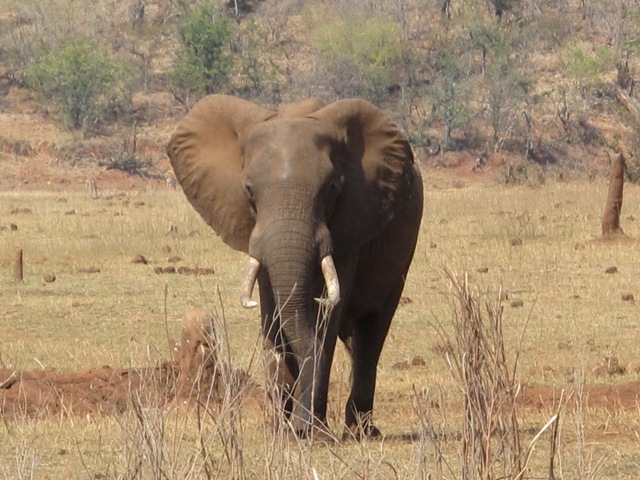 Of course, Jephita’s hasty departure and the bull’s startled response jolted me from slumber and I sat bolt upright, staring up at tons of startled elephants through the tent flap. I should imagine my staring was wide-eyed but cannot remember much more than that massive, star-blocking bulk looming above, ears fanning and back peddling, in slow motion. If I had been able to stop looking that elephant in the eye and wrench my eyes downward, I guess I would have experienced the closest ankle view I’ve ever had of a wild elephant. Fortunately, the bull wheeled away and decamped, and fortunately, his chosen route of decamp was not over our camp. Though wide awake, I did not talk to Jephita when he returned to the tent some time later. There is only so much one can say. His foolhardiness could have caused us to lose our lives. Now how would that look in the headlines, I ask you? ‘Borderline Walkers erased by tame elephant bull at Nyamepi family pleasure resort.’ The story could go on to say something like, ‘Officials say the elephant cannot be blamed as it has been resident at Nyamepi for 30 years and is often seen wandering peacefully about between groups of playing children….’
Of course, Jephita’s hasty departure and the bull’s startled response jolted me from slumber and I sat bolt upright, staring up at tons of startled elephants through the tent flap. I should imagine my staring was wide-eyed but cannot remember much more than that massive, star-blocking bulk looming above, ears fanning and back peddling, in slow motion. If I had been able to stop looking that elephant in the eye and wrench my eyes downward, I guess I would have experienced the closest ankle view I’ve ever had of a wild elephant. Fortunately, the bull wheeled away and decamped, and fortunately, his chosen route of decamp was not over our camp. Though wide awake, I did not talk to Jephita when he returned to the tent some time later. There is only so much one can say. His foolhardiness could have caused us to lose our lives. Now how would that look in the headlines, I ask you? ‘Borderline Walkers erased by tame elephant bull at Nyamepi family pleasure resort.’ The story could go on to say something like, ‘Officials say the elephant cannot be blamed as it has been resident at Nyamepi for 30 years and is often seen wandering peacefully about between groups of playing children….’
Mana
On a more serious note… by that stage, I was a worried Walker, not a happy camper. I was certain my camera was going to give up the ghost at any moment, thunderheads were building up and bursting ominously over the Zambian escarpment daily, Jephita’s personal problems were becoming a major issue, and I was beginning to come to terms with the fact that a push for Kanyemba might not be the wisest plan of action. I did what I seldom do and forced myself to become realistic. My final decision was to make a final decision at Chikwenya camp, which is only a day’s hike from Nyamepi. The Mana Pools Parks Rangers told me that Chikwenya had not yet wrapped up operations, and so I knew we could get a ride out from there, at some stage.
The walk from Nyamepi to Chikwenya would have been just as exhilarating as the rest of Mana had been, were it not for the problems I was pondering. What I do remember with clarity was the almost unbelievable number of dagga boys (bachelor buffalo bulls) we saw en route. Now here is an interesting fact for digestion – throughout Mana Pools, from Rukomechi to Chikwenya, we must have spotted a couple hundred buffalo, and every single one was a bull! We didn’t see one herd, only groups of dagga boys! Of course, the cows had moved off the river with the early rain, but still, one would have expected to see at least one cow! I was simply astounded by that… the biggest group of dagga boys we encountered numbered 16 bulls.
We reached Chikwenya late in the day on December 3rd and were warmly welcomed by the stand-in manager, young York Mare, a learner professional hunter attached to HHK Safaris that operates Chikwenya. The morning after our arrival, I went out fishing in a boat with York and about half a dozen camp workers. The workers wanted to catch some fish to take home for their families, when they did get the go ahead from head office to light out. York told me that he was expecting the call any time soon. What a quandary I was in, and my mood was not improved by my failure to hook into a decent fish the entire day.
Rubbing salt into it all were the other fishermen who were hauling the tigerfish in – a number of 5/6 pounders, one or two 8 pounders, and unbelievably, a 14-pounder landed by York. How jealous I was of that fish! The same weight as a dozen of my biggest fish, and I had only landed two of those minnows… Oh, the frustration! It was all for a reason though, as I would discover the following day. That night the first real rains of the season pounded down. A couple of inches at least, with the promise of much more filling the skies.
I was extremely restless the next day, much disturbed by the ‘should we stay or go’ issue, pacing about the place. I truly did not want to pull out and would have sent Jephita home alone, were it not for the camera issue. From the very beginning of this expedition, I have maintained that I could manage with the loss of any piece of equipment but the camera. I could not progress without a camera, simple as that – we would be completely grounded if it packed up or was stolen. I knew that my camera was not going to last much longer, and that was the only factor which caused me to even consider stopping, but it was such a major factor that it overruled all the negative aspects of pulling out, and there were many of those. To help me come to terms with everything and deal with accepting the decision I suppose had already been made, I decided to go fishing again, from the bank this time. And so I located Willy, Chikwenya’s number one fishing guide, and asked him if he’d like to accompany me. Willy said he would indeed, and so we headed off together with rods and a little bait, walking upstream, over the dry Sapi riverbed and a couple of kilometers beyond. Willy informed me that fishing from the bank was never as good, but that one or two lunkers had been taken that way in the past.
And so we fished and fished and fished, chatting a little at times, as the sun sunk lower in the west and we made our way slowly down the riverbank, back towards camp. We must have had our lines in the water for 3 hours that afternoon and were not rewarded with so much as a knock. Even Willy, the ‘you’ve got to be in it to win it’ master fisherman was probably beginning to wonder why he was ‘in it’ by that stage. Then again, probably not – he has more than enough fishing experience to know better. But I was definitely beginning to wonder why I had my line in the water, and was just contemplating packing it in, when I noticed a heavy drag on my line. Muttering about stick and weed, I began reeling in. Willy looked my way and I muttered louder about stick and weed in response to his silent question. Either a big clump of weed or a stick, I thought, as I tightened the ratchet and slid down the steep embankment to the very water’s edge, to achieve an easier working angle. My reel was almost full and I was peering into the shallows to try and ascertain what I’d hooked, strained rod-tip bent downward and line taut, when I espied what I’d hooked and was shocked into immediate action.
In that instant I knew I’d hooked the biggest tigerfish of my life. The fish had swallowed the bait and hook and then swum with the pull of the line, against the current. As I saw it, the tigerfish exploded, churning up the shallows and powering itself into deeper water. Fortunately, my drag was not set too tight (considering I’d been hauling in a clump of weed or a stick seconds before), and the reel squealed as the biggest tigerfish I’d ever hooked made its first break. It ran three times, that awesome fish, and each run was shorter and less determined than the one before, in direct contrast to the yells of encouragement Willy was contributing. Willy’s yells only became more determined! ‘Chirarwo pasi! Keep your rod down! Line tight!’ Over and over again, with the occasional ‘Chenjera ngwena! Watch out for crocs’, interspersing the fishing basics.
Finally, the tiger tired and I brought it carefully into the shallows, before stepping into the water and gilling it. Yes, I know all about tigerfish teeth – I didn’t care how much damage my fingers sustained at that stage!
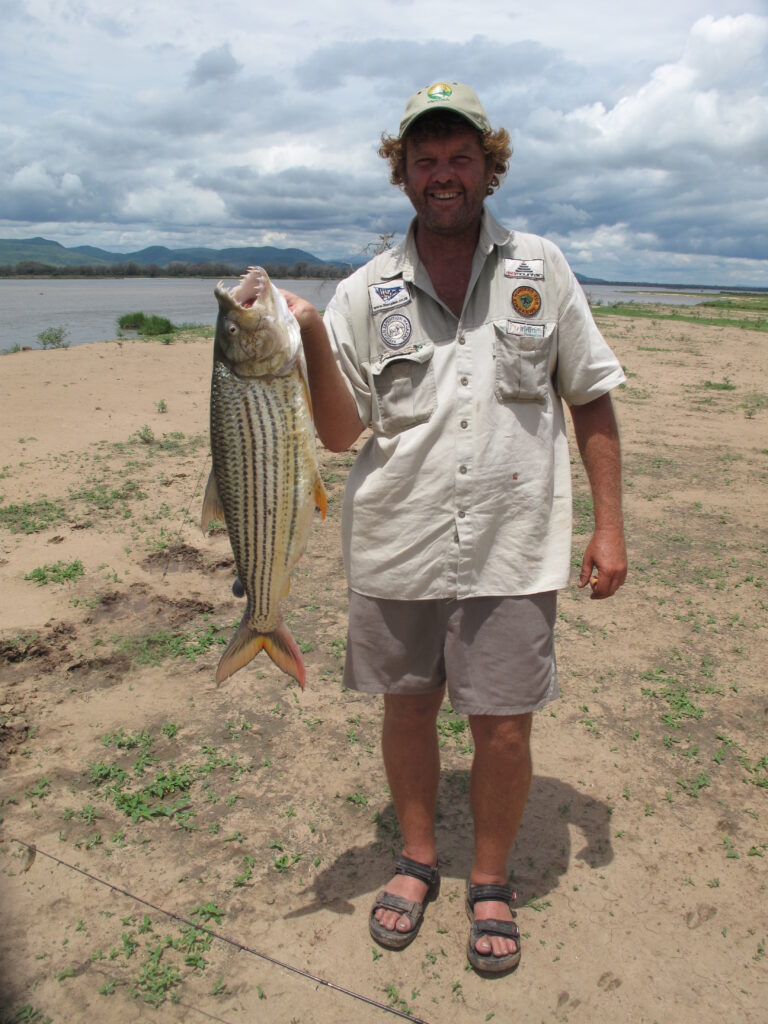 Once my trophy was landed, I hugged Willy with sheer delight. Slightly ruffled, he appraised the fish and stated it would weigh almost 13 pounds. Willy was right on the mark – the biggest tiger I have ever landed was just shy of 13 pounds.
Once my trophy was landed, I hugged Willy with sheer delight. Slightly ruffled, he appraised the fish and stated it would weigh almost 13 pounds. Willy was right on the mark – the biggest tiger I have ever landed was just shy of 13 pounds.
Many of my concerns became irrelevant with the landing of that fish, and when we got back to camp, after chatting some with York, I began packing my kit. The Chikwenya guys were pulling out the next day and we were going with them. It would be three months before we returned. My camera lasted a few more days and then died quietly. I lost a good friend – that hardy little Canon G10 had been my companion through tough territory and times, and had served so well.

